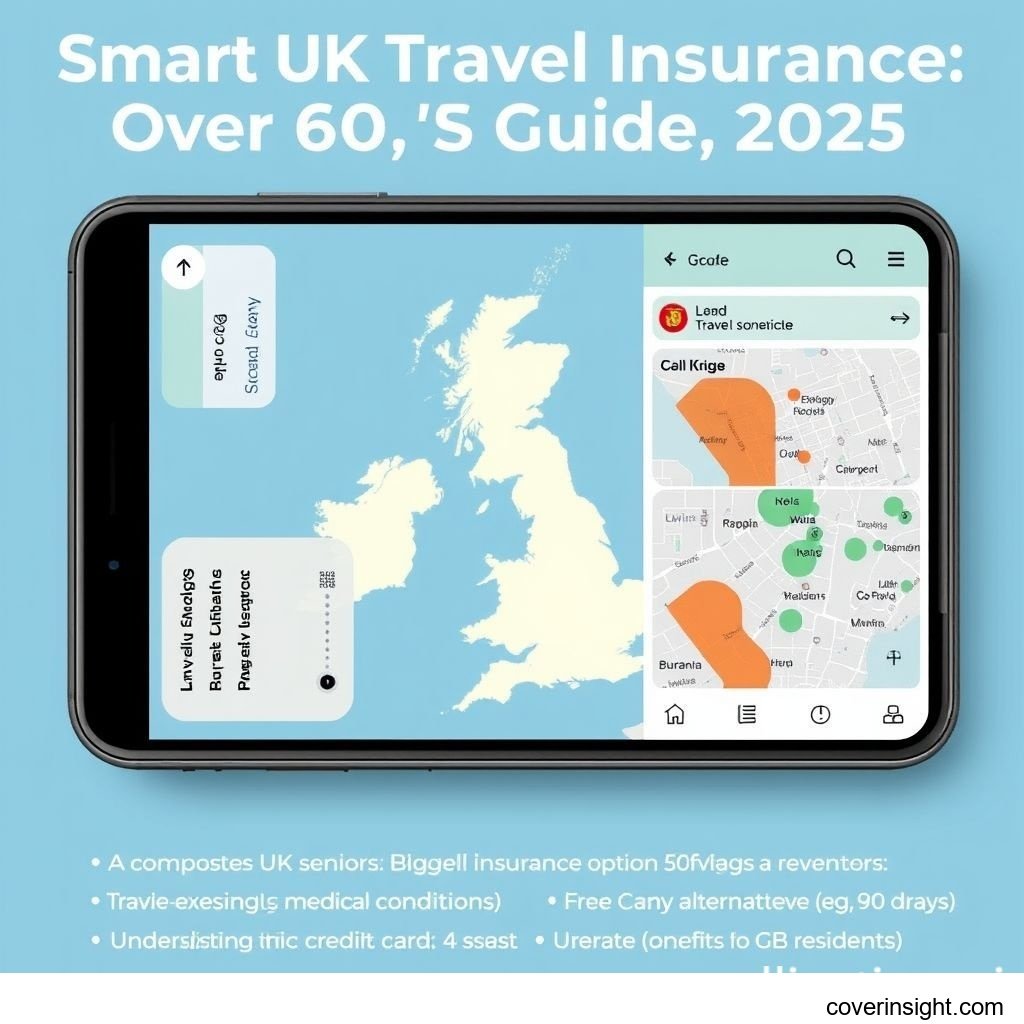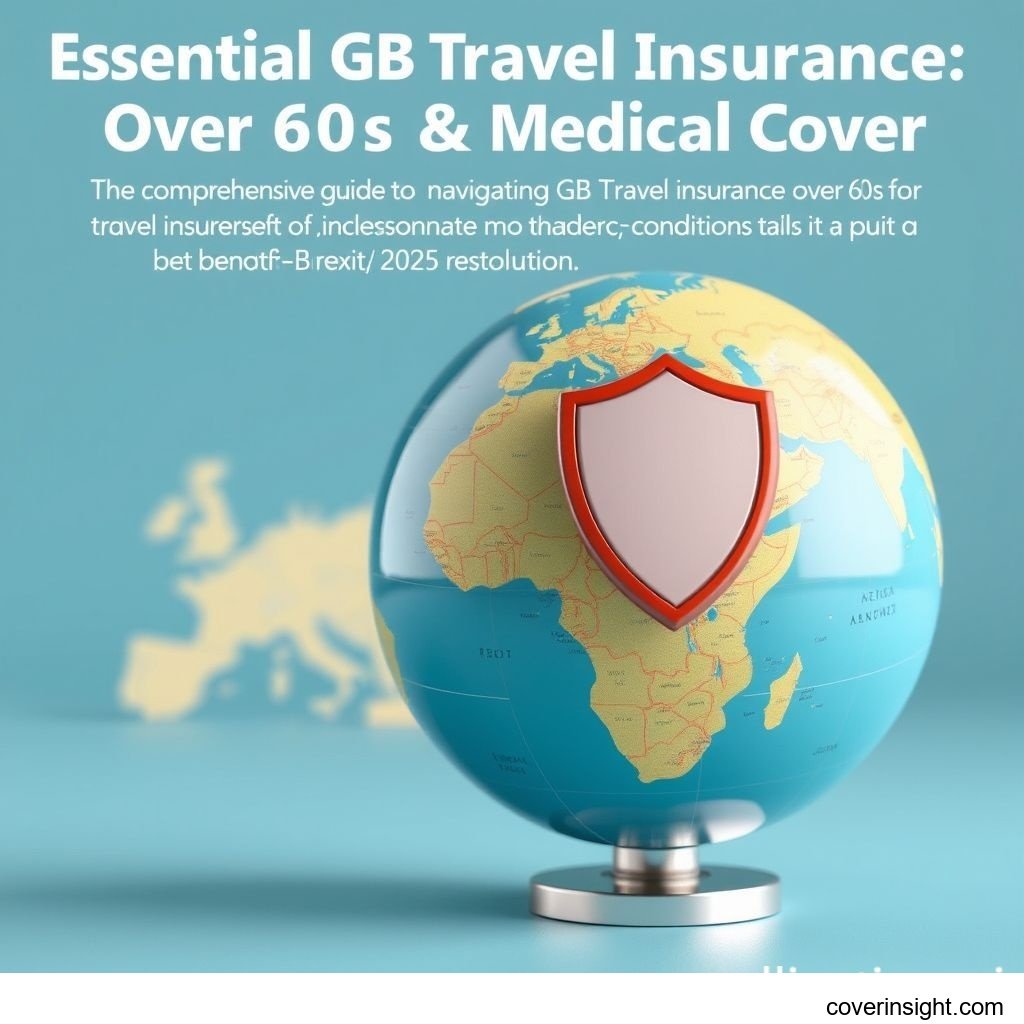Smart UK Travel Insurance: Over 60s Guide 2025
Introduction
As 2025 approaches, the landscape of travel for over 60s in Great Britain continues to evolve, making comprehensive travel insurance for over 60s more crucial than ever. Whether you're planning a serene cruise, an adventurous tour, or a relaxing beach holiday, ensuring you have the right protection is paramount. This guide will walk you through everything you need to know about securing smart and reliable coverage, helping you travel with peace of mind. Without adequate travel insurance for over 60s, unforeseen circumstances like medical emergencies abroad, trip cancellations, or lost baggage can turn a dream holiday into a financial nightmare. Planning ahead ensures you’re covered for any eventuality.
Understanding Travel Insurance for Over 60s
The need for specialized travel insurance for over 60s arises from several factors, including potential age-related health considerations and the desire for tailored benefits. It's not just about covering emergencies; it's about finding a policy that genuinely fits your lifestyle and travel plans.
Why Specialized Cover Matters
Standard travel insurance policies often have age limits or may not provide adequate coverage for older travellers, especially concerning medical conditions. Specialized travel insurance for over 60s is designed to address these unique needs, offering:
-
Higher Medical Limits: Reflecting the potentially higher cost of medical treatment for older individuals.
-
Pre-existing Condition Coverage: Options to declare and cover a wider range of medical conditions, often without excessive premiums.
-
Enhanced Cancellation Protection: Protecting significant investments made in trips.
-
Access to Specialist Helplines: Dedicated support services designed for the specific concerns of older travellers.
Single vs. Annual Policies
When considering travel insurance for over 60s, you'll typically choose between two main types of policies:
-
Single-Trip Policies: Ideal if you only plan one holiday in the year. They cover a specific trip from start to finish. These are often chosen for longer, more expensive, or unique journeys.
-
Annual Multi-Trip Policies: More cost-effective if you plan to take multiple trips within a 12-month period. They offer convenience, as you only need to arrange your travel insurance for over 60s once. However, they usually have limits on the duration of each individual trip.
Choosing the right type depends entirely on your travel frequency and preferences. Many find annual policies simplify their travel arrangements.
Coverage Details
Understanding what's included and, equally important, what's excluded from your travel insurance for over 60s policy is fundamental to avoiding unpleasant surprises.
What’s Included
A robust travel insurance for over 60s policy should offer comprehensive protection across several key areas:
-
Emergency Medical Expenses: This is arguably the most critical component. It covers hospital stays, doctor's fees, emergency dental treatment, and potentially repatriation back to the UK. Ensure the medical cover limit is substantial – often £2 million to £10 million or more is recommended for international travel.
-
Trip Cancellation, Curtailment, and Interruption: Covers non-refundable costs if you have to cancel your trip due to unforeseen circumstances (e.g., illness, bereavement) or cut it short.
-
Baggage and Personal Belongings: Protection against loss, theft, or damage to your luggage, passports, and personal items.
-
Personal Liability: Covers legal costs and damages if you accidentally injure someone or damage their property while abroad.
-
Travel Delay and Missed Departure: Compensation for significant delays, or if you miss your flight due to circumstances beyond your control.
-
24/7 Emergency Assistance: Access to a helpline for medical emergencies, travel advice, and support no matter where you are in the world.
-
COVID-19 Coverage: Most modern policies include specific provisions for COVID-19 related disruptions, such as medical treatment abroad if you contract the virus, or cancellation cover if you're unable to travel due to diagnosis.
-
EHIC replacement coverage: While the EHIC (European Health Insurance Card) has been largely replaced for UK citizens, good policies offer similar reciprocal healthcare benefits or robust medical cover within Europe, ensuring you're not left exposed to high medical bills. This is a crucial element of modern travel insurance for over 60s for European destinations.
Common Exclusions
Even the best travel insurance for over 60s policies have limitations. Be aware of these common exclusions:
-
Undisclosed Pre-existing Medical Conditions: Failing to declare a medical condition will likely invalidate claims related to it.
-
Alcohol or Drug-Related Incidents: Injuries or incidents occurring under the influence are typically not covered.
-
Participation in Risky Activities: Activities like bungee jumping, skydiving, or certain winter sports often require specific add-ons or may be entirely excluded.
-
Travelling Against Medical Advice: If your doctor advises against travel, your policy might be void.
-
Undeclared Valuables: High-value items may have individual limits or require specific listing.
-
Acts of War or Terrorism: While some policies offer limited cover, widespread conflict zones are usually excluded.
-
Self-inflicted Injury: Intentional self-harm is never covered.
Always read the Policy Wording (Insurance Product Information Document) thoroughly before purchasing travel insurance for over 60s to understand the full scope of cover and any exclusions.
Navigating Pre-existing Medical Conditions
One of the primary concerns for securing travel insurance for over 60s is how pre-existing medical conditions are handled. It's a critical aspect that directly impacts your eligibility and the cost of your premium.
Declaring Your Health
It is absolutely vital to be completely honest and declare all pre-existing medical conditions when applying for travel insurance for over 60s. This includes conditions you are currently being treated for, conditions you have received treatment for in the past, and even conditions for which you are awaiting a diagnosis or test results. Failure to do so could lead to your claim being rejected, leaving you personally responsible for substantial medical bills abroad. Insurers use this information to assess the risk and provide appropriate cover. They may ask about:
-
Your diagnosis and symptoms
-
Medications you are taking
-
Any surgeries or hospitalisations
-
Recent medical appointments
Specialist Providers for Travel Insurance for Over 60s
For those with more complex or multiple pre-existing medical conditions, finding suitable travel insurance for over 60s through mainstream providers can be challenging or expensive. Fortunately, a growing number of specialist insurers cater specifically to this demographic. These providers often have:
-
Higher Age Limits: Accommodating travellers well into their 80s, 90s, and beyond.
-
Flexible Underwriting: A more nuanced approach to assessing risk for various health conditions.
-
Tailored Policies: Designed to offer comprehensive cover even for serious conditions like heart disease, cancer, or diabetes.
Using an independent broker or a comparison website that specialises in medical travel insurance for over 60s can help you find these niche providers and compare their offerings.
Cost Analysis for Travel Insurance for Over 60s
The cost of travel insurance for over 60s can vary significantly, depending on a multitude of factors. Understanding these elements can help you find a policy that offers excellent value without compromising on essential protection.
Price Factors
Several key elements influence the premium for your travel insurance for over 60s:
-
Age: Generally, the older you are, the higher the premium, as the risk of medical claims increases with age.
-
Destination: Travel to countries with high medical costs (e.g., USA, Canada, Caribbean) will typically result in higher premiums than travel within Europe.
-
Duration of Trip: Longer trips inherently carry more risk and thus cost more.
-
Medical Conditions: As discussed, declared pre-existing conditions are a major factor, with more serious or multiple conditions leading to higher costs.
-
Type of Policy: Annual policies can be more cost-effective for frequent travellers than multiple single-trip policies.
-
Level of Coverage: Policies with higher medical limits, more comprehensive cancellation cover, or added benefits will naturally be more expensive.
-
Excess: Choosing a higher excess (the amount you pay towards a claim) can sometimes reduce your upfront premium, but consider if you're comfortable paying that amount in an emergency.
Saving Tips
While you shouldn't compromise on essential cover, there are smart ways to potentially reduce the cost of your travel insurance for over 60s:
-
Shop Around: Use online comparison websites to get quotes from multiple providers. Different insurers specialise in different demographics and conditions.
-
Consider an Annual Policy: If you plan more than one trip in a year, an annual multi-trip policy is almost always cheaper than buying individual policies.
-
Increase Your Excess: If you have savings and are comfortable with a higher out-of-pocket expense in case of a claim, increasing your excess can lower your premium.
-
Group Policies: If travelling with family or friends, some insurers offer discounts for group policies.
-
Declare Accurately: While it might seem counter-intuitive, providing full and accurate information about your health and travel plans can prevent claims being denied, which ultimately saves money. Don't hide conditions to get a cheaper quote; it's a false economy.
-
Review Existing Policies: Check if you have any existing cover through bank accounts or credit cards. Some premium bank accounts or credit card travel insurance might offer basic cover. However, be extremely cautious here: credit card travel insurance often has significant limitations, particularly concerning age limits and pre-existing medical conditions, making dedicated travel insurance for over 60s almost always a safer and more comprehensive option. Always read the terms and conditions carefully before relying on credit card travel insurance.
-
Travel to Lower-Risk Destinations: If flexibility allows, choosing destinations with lower medical costs can reduce premiums.
For further guidance on financial products, you can consult the Financial Conduct Authority which regulates the insurance industry in the UK.
Comparing Policies and Making a Choice
With numerous options for travel insurance for over 60s, selecting the right policy requires careful consideration beyond just the price.
What to Look For
When comparing different policies, focus on these key aspects:
-
Medical Emergency Cover Limit: Ensure it’s high enough for your destination. £2 million for Europe and £5-10 million for worldwide is a good benchmark.
-
Repatriation Costs: Confirm that the policy covers the cost of bringing you back to the UK if medically necessary.
-
Cancellation Cover: Does it cover the full cost of your non-refundable trip expenses?
-
Baggage and Personal Belongings Limits: Are these sufficient for the value of items you're taking? Check single item limits.
-
Emergency Assistance Service: Is it 24/7 and staffed by experienced professionals?
-
Pre-existing Medical Condition Inclusion: Confirm all your declared conditions are explicitly covered.
-
Policy Excess: What is the amount you'd have to pay if you make a claim?
-
Activity Cover: If you plan any specific activities (e.g., cruising, specific sports), ensure they are included or can be added.
-
COVID-19 Provisions: Understand exactly what your policy covers in relation to pandemic-related issues.
Online Comparison Tools
Utilising online comparison websites is an excellent way to survey the market for travel insurance for over 60s. These platforms allow you to input your details once and receive multiple quotes from various insurers. However, remember to:
-
Enter Accurate Details: Inaccurate information will lead to invalid quotes.
-
Filter by Your Needs: Use advanced filters to ensure quotes meet your specific requirements (e.g., maximum age, pre-existing conditions, cruise cover).
-
Read Reviews: Check customer reviews for insurers to gauge their reputation for claims handling and customer service.
-
Check the Fine Print: Always click through to the insurer's website and read the full policy document (IPID) before purchasing.
For more insights into the broader insurance market, the Association of British Insurers provides valuable resources and statistics. For specific UK-based insurance resources, you can visit GB Insurance Home. Additionally, for a global perspective on insurance best practices and general travel advice, explore Insurance Resources Global.
FAQs
Here are some of the most frequently asked questions about travel insurance for over 60s:
-
How much does travel insurance for over 60s cost?
The cost varies significantly based on age, destination, duration, and health. A basic single-trip policy for a healthy 65-year-old travelling to Europe for a week might start from £20-£50, while an annual worldwide policy for someone with multiple pre-existing conditions could range from £200 to over £1000. It's essential to get a personalised quote.
-
What affects premiums?
Key factors influencing premiums include your age, the destination's medical costs, the length of your trip, any pre-existing medical conditions you declare, the type of policy (single or annual), and the level of cover chosen (e.g., high medical limits, specific add-ons).
-
Is it mandatory?
No, travel insurance for over 60s is not legally mandatory for travelling abroad from the UK. However, it is highly recommended. Many tour operators and cruise lines require you to have adequate insurance as a condition of booking, especially for older travellers. The financial risks of not having it, particularly for medical emergencies, are substantial.
-
How to choose?
Start by assessing your specific needs: your age, health conditions, travel frequency, and destinations. Use comparison sites to get multiple quotes, then carefully compare the cover details (especially medical and cancellation limits), exclusions, and the insurer's reputation. Don't simply choose the cheapest option; prioritise adequate cover for your circumstances.
-
What are the consequences of no coverage?
Travelling without travel insurance for over 60s can lead to devastating financial consequences. You would be personally liable for all costs if something goes wrong, including:
-
Emergency medical treatment abroad, which can run into tens or even hundreds of thousands of pounds.
-
Repatriation costs (being flown home due to illness or injury), which are incredibly expensive.
-
Costs of cancelling or cutting your trip short.
-
Replacement costs for lost or stolen luggage and passports.
For serious incidents, these costs could easily amount to more than the cost of your entire holiday, potentially leading to significant debt.
-
In conclusion, investing in appropriate travel insurance for over 60s is a smart decision that provides invaluable protection and peace of mind, allowing you to focus on enjoying your adventures in 2025 and beyond. Remember to plan ahead and compare thoroughly.








Comments